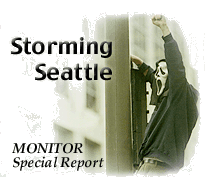
Declaration of Emergency
by Paul de Armond
 |
by Paul de Armond |
|
Before
noon, security officials had been requesting the mayor issue a declaration of civil emergency. Seattle's civil emergency ordinance, officially titled Seattle Municipal Code 10.02, dates from 1973, when it was passed in response to Viet Nam war protests. After the Gulf War protests in 1992, some sections were revised. It is a sweepingly broad ordinance, which authorizes "extraordinary measures," including declaration of curfew, commandeering of property, closure of businesses, prohibition of alcoholic beverages, bans on the carrying or possession of firearms and any other measures the mayor deems necessary. Under the ordinance, the mayor may issue orders "requesting federal and/or state assistance in combating such civil emergency" and "closing to the public any or all public places including streets, alleys, public ways, schools, parks, beaches, amusement areas, and public buildings."
Mayor Schell spent most of the day at the WTO conference site, waiting for the opening ceremonies to begin. He did not arrive at the Multi-Agency Command Center in the Public Safety Building until about 3PM, two hours after the ceremonies had been canceled. Beginning around 1PM, Governor Gary Locke had set in motion a series of unilateral actions including starting the call-up of the National Guard and authorizing the movement of Washington State Patrol units from around the state to Seattle. He arrived at the MACC at 2:50PM, about ten minutes ahead of the mayor. Upon Schell's arrival, officials from the SPD, Secret Service, FBI, State Patrol, Department of Justice, State Department, King County, the governor's office and the White House moved into a back room and engaged in a heated discussion. While the argument continued, U.S. Attorney General Janet Reno called the governor and insisted that the National Guard be called up. After speaking with Reno, Locke met with the mayor. Schell then spoke with Assistant Police Chiefs Joiner and Pirak. "By that time, we had a chance to look at what was happening. The mayor immediately agreed and authorized (the emergency declaration)," said Joiner. "There was never any hesitation." The period between the mayor's arrival at the MACC and issuing the proclamation of civil emergency was less than half an hour. At 3:24PM, the mayor issued the emergency declaration. What the declaration of civil emergency meant became a source of constant confusion during the period they were in effect. The mayor banned the possession of gas masks, but it continues to be unclear what law was violated by their possession. The "no protest" zone was open to some people and closed to others. Police took to enforcing an informal dress code, arresting people based on their appearance. In one case, an arrest was made for possession of an anti-WTO button. Conflicting statements were made by police officials about what was or was not allowed in the downtown area. Protesters had signs taken away from them in areas outside the "no protest" zone, but were not arrested. Others were arrested both inside and outside the zone. On Wednesday afternoon, the governor made a statement on television that order had been restored to downtown and invited people to come shopping, implying that the downtown was open and the curfew was lifted. Wednesday night, residents of Capitol Hill were arrested on their doorsteps when they asked police what was going on. The ACLU went to federal court and was turned down on the first of several legal challenges to the emergency ordinance.
Albion Monitor
February 29, 2000 (http://www.monitor.net/monitor) All Rights Reserved. Contact rights@monitor.net for permission to use in any format. | ||||||||